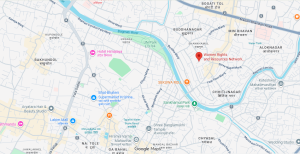The program started with the general introduction session by all the present participants from Bungdal CFUG, from team of WRRN and the facilitation team. After the introduction session, the participants were provided with the overview of the visit and the session on discussion about intergenerational issues started formally. The session provided by Mr. Yadav was started with the general introduction of Sustainable Forest Management (SFM), Agroforestry, Eco-tourism and Forest Conservation and Utilization. Bungdal CFUG, which have been managing their CF for generations, serves as an example of traditional forest management practices that had been transferred from generation to generation. Through the discussion, participants were given knowledge about Sustainable Forest Management techniques since no any specific felling practices have been practiced by the CFUG members. The forest of Bungdal CF have been divided into 5 blocks and the proper management of blocks within certain time has become a very challenging topic for the CFUG. In this regard, the less participation of women and youth also have some reasonable factor regarding the forest management. Though, women are more dependent in CF for their livelihood upliftment and subsistence living, women are unaware about the recent developments that have been occurred in the field or with the contemporary legal requirements applied to forestry operations. Such a lack of information may at times limit their ability to properly capitalize on the forest’s opportunities or to adhere to new rules.
Dr. Yadav emphasized the importance of integrating youths and women’s perspectives during the whole session for the achievement of SFM. He noted that SFM is not merely about managing trees but encompasses a broader understanding of biodiversity, economic viability, and social governance. This holistic approach ensures that all stakeholders, particularly marginalized groups, have a voice in decision-making processes.
The post session after a break, Dr. Yadav focused on silviculture importance and techniques, where he mentioned silviculture as the backbone of sustainable forest management. He asserted that effective silvicultural practices are essential for maintaining healthy forests and ensuring the continuous provision of forest products and services. By engaging youth and women in silviculture practice to attain SFM, they should be engaged in forest and should get benefitted by it for the motivation.
After all these discussions, the final part of the program focused on amendment and proper implementation of Operational Plans (OPs), which serve as an essential document for CFUGs to manage their forest effectively. He focused that the CF rules and provisions need to be taken seriously for the better functioning of the CF activities providing participants with an example of a case of one CFUG. Finally, Dr. Yadav emphasizes the need for ongoing dialogue and collaboration among various stakeholders, including government bodies, civil society organizations, and local communities. He believes that fostering partnerships is crucial for advancing forest conservation and utilization efforts effectively. By maintaining an inclusive approach that values diverse perspectives, the forestry sector can achieve its goals of sustainability and resilience, ultimately benefitting both current and future generations






